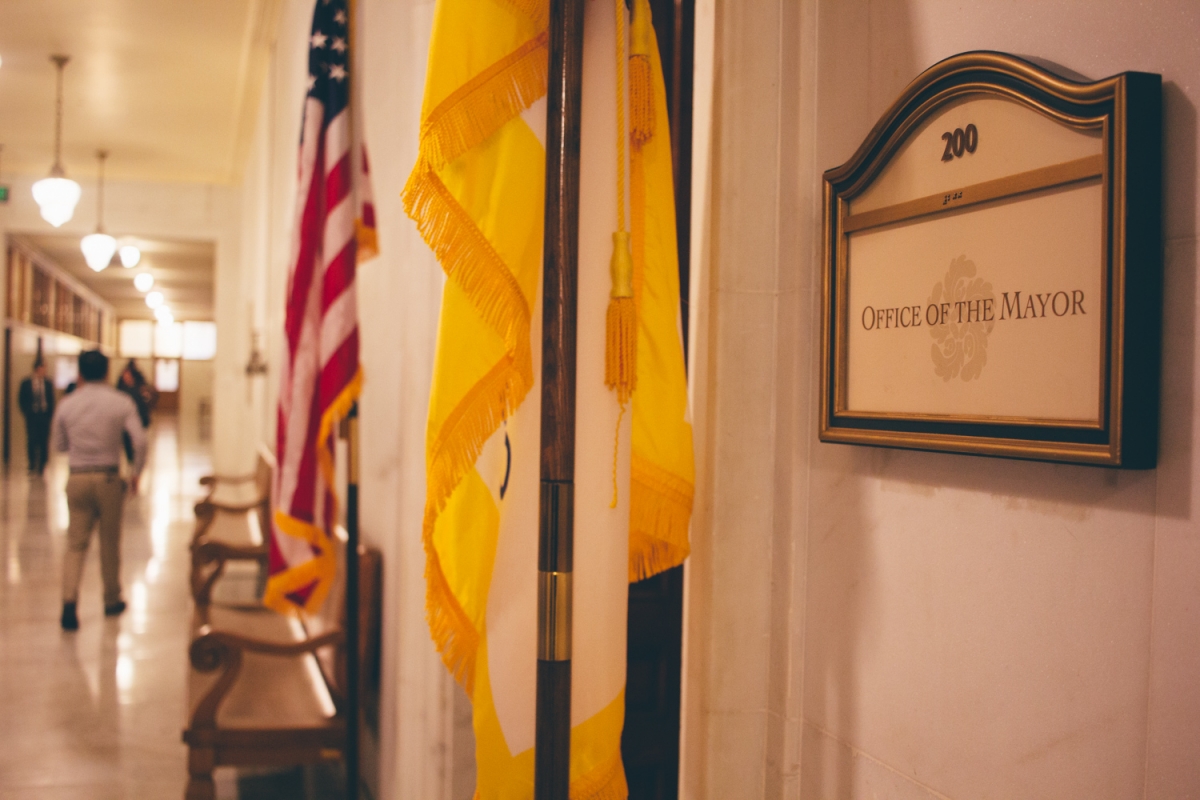
This Charter amendment would make two major city agencies accountable to a new, third body, called the Housing and Development Commission.
The supervisors voted 6-5 to put this initiative on the ballot. Voting for: John Avalos, David Campos, Jane Kim, Eric Mar, Aaron Peskin and Norman Yee. Voting against: President London Breed, Malia Cohen, Mark Farrell, Katy Tang and Scott Wiener.
Why is this on the ballot?
Peskin wrote this ballot measure to increase the transparency, accountability and oversight for the mayor’s offices of Economic and Workforce Development, and Housing and Community Development.
 |
| The proposed new commission would oversee two important departments close to the Mayor’s Office. Photo by Nadia Mishkin / San Francisco Public Press |
In his official argument, Peskin writes, “Some of the most important decisions about San Francisco housing and economic development are being made today behind closed doors.”
Opponents counter that Proposition M would complicate and slow the work of those agencies.
The Office of Economic and Workforce Development oversees job-training programs, manages City Hall’s efforts to attract commerce, and participates in negotiations between the city and developers or landowners. The Mayor’s Office of Housing and Community Development manages how the city obtains money and spends it on the construction and rehabilitation of affordable housing.
This measure was hotly debated at a July meeting of the Board of Supervisors’ Rules Committee. Its authors said the two departments often decide how to spend large amounts of public dollars through an internal vetting processes, without oversight. Cohen, who did not co-sponsor the measure, said the Office of Housing and Community Development was especially opaque and noncommunicative.
The heads of the two affected offices said that their operations were already accountable and transparent enough, and that additional oversight and bureaucracy would slow their work. They also said they doubted the commission’s members would possess the expertise to oversee their departments effectively.
In a conversation with the Public Press, Kate Hartley, the deputy director for the Office of Housing and Community Development, pushed back on the notion that her office was opaque to the Board of Supervisors. Hartley, who has held the position for more than two years, said that during her tenure only one of the office’s projects had not gone to the board for review, and that was because it was for minor rehabilitation work. All other projects went before the board, typically three times each, and in those instances the board was empowered to tie the office’s purse strings and halt development, she said.
But Peskin said that to his knowledge, the larger problem was that the office pursues projects on a case-by-case basis rather than as part of a strategic plan. A commission would create such a plan, he said.
What would it do and at what cost?
If passed, Proposition M would create the Housing and Development Commission. The commission would have seven members: three nominated by the mayor, three appointed by the Board of Supervisors and one appointed by the city controller. The mayor’s picks would need the board’s approval.
The controller’s office estimates that the new commission would cost about $210,000 a year — a “minimal impact.” Funds to pay for commissioner compensation, a secretary and preparing public materials would come from the departments of Economic and Workforce Development, and Housing and Community Development.
The commission would oversee two existing city agencies, whose names would be altered slightly: The Department of Economic and Workforce Development and the Department of Housing and Community Development.
In this capacity, the commission would:
- Be able to appoint and remove the heads of those two departments.
- Oversee funding for affordable housing and craft rules for building it.
- Advise the Board of Supervisors on whether to approve developments that would result in new home construction or increased economic activity, such as large-scale housing and office projects.
- Advise the board whenever changes to the city’s inclusionary housing laws were proposed. Developers are required either to build or to pay for new affordable housing alongside their larger, market-rate projects.
- Advise the board on whether to sell the city’s surplus properties.
Who officially proposed it?
Supervisor Aaron Peskin is the author, and supervisors Jane Kim and Eric Mar are co-sponsors.
In addition, the measure is supported by supervisors Norman Yee and John Avalos; former Supervisor and California Assemblyman Tom Ammiano; and former City Attorney Louise Renne.
Who officially opposes it?
U.S. Sen. Dianne Feinstein, former San Francisco mayor; former mayors Willie Brown and Frank Jordan; Lt. Gov. Gavin Newsom, former mayor of San Francisco; and Angela Alioto, former president of the Board of Supervisors.
Feinstein wrote the official opposition argument.
Vote threshold to pass
Simple majority — 50 percent plus one
Effective date if passed
Commissioners would begin serving March 1, 2017.
Follow the money
One committee is spending money to support Proposition M: “Housing Forward SF, Yes on C & M, No on P & U.”
Two committees are spending money to oppose the measure: “San Franciscans Against Wasteful Spending, No on Propositions D, H, L & M,” and “No Recall on Mayor Lee, No on D, H, L, and M.”
Follow the money at the San Francisco Ethics Commission: all Proposition M filings.
Endorsements: our methodology
The Public Press chose to count endorsements from organizations that backed multiple candidates or ballot measures, and that made those endorsements available online. We did not count endorsements from individuals.
If you think we missed an important organization, please tell us. We’d love to hear from you.
Tracked endorsements by organization
Written by: Noah Arroyo
Published: Sept. 30, 2016






